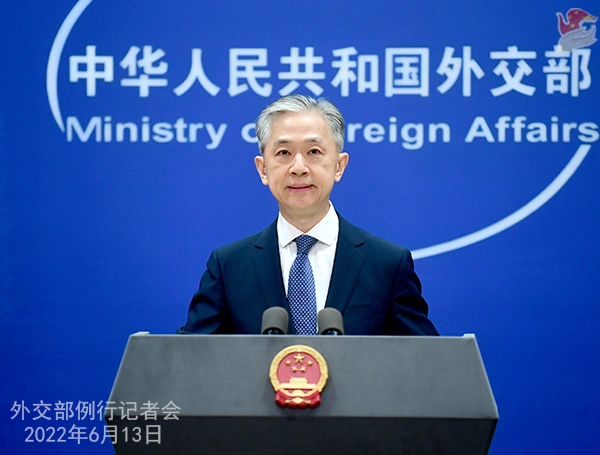BEIJING, June 14 (ABC): A Chinese Foreign Ministry spokesperson on Monday urged the United States to match its words with action, including not seeking confrontation or conflict, not seeking a new Cold War, and not seeking an Asian NATO or a region split into hostile blocs, and to stop saying or doing things that could create division and confrontation.
Spokesperson Wang Wenbin made the remarks at a daily news briefing in response to a query regarding the U.S. Secretary of Defense Lloyd Austin’s speech at the Shangri-La Dialogue.
“By repeatedly spreading disinformation and painting an ugly picture of China, the United States could only further expose its ill intention to sow discord and the true nature of its hegemonic practices and exercise of power politics,” said Wang.
Wang added that the biggest threat to the peace and stability across the Taiwan Strait does not come from elsewhere but the obdurate separatist activities of the “Taiwan independence” forces and the U.S. connivance and endorsement of such activities.
“It is the United States that has sought to obscure and hollow out the one-China principle and kept backpedaling on its commitments. It is the United States that is relaxing restrictions on official interactions between the United States and Taiwan and increasing the sales of weapons to Taiwan both in qualitative and quantitative terms. It is still the United States that has been helping Taiwan expand the so-called international space and even acting openly to support Taiwan in ‘strengthening’ its so-called ‘diplomatic relationships’,” Wang said.
“What could possibly be the aim of the United States for these actions other than to send wrong signals to the ‘Taiwan independence’ forces and undermine cross-Strait peace and stability?” he said.
Noting the United States is the biggest factor fueling militarization in the Asia-Pacific, Wang said that the United States has deployed military aircraft and warships in the South China Sea on a regular basis and its reconnaissance aircraft have electronically impersonated the civil aircraft of other countries there many times.
Citing statistics from institutions with professional knowledge, Wang said the number of the U.S. close-in military reconnaissance missions against China has more than doubled from a decade ago, adding that since the beginning of this year, the U.S. naval ships have transited the Taiwan Strait once a month on average, and U.S. military aircraft have engaged in large-scope, frequent and provocative close-in reconnaissance to deter and pressure China.
“Apparently, ‘militarization’ and ‘endangering freedom of navigation’ are more accurate when used to describe the behavior of the United States,” Wang said.
“The international community will not be deceived by the U.S. remarks to smear China. What the United States has said will only inflict on its own credibility,” added the spokesperson.

